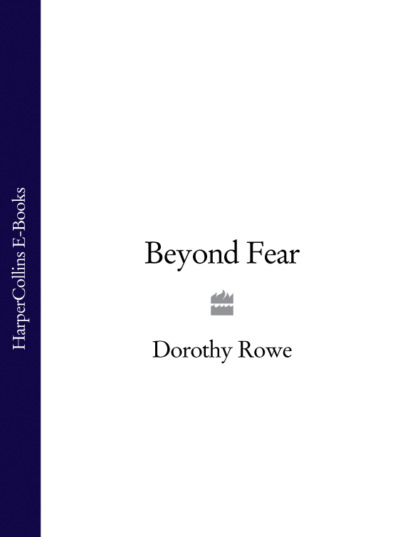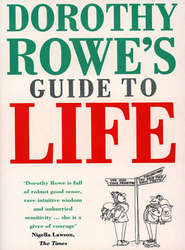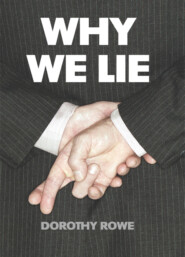По всем вопросам обращайтесь на: info@litportal.ru
(©) 2003-2024.
✖
Beyond Fear
Автор
Год написания книги
2018
Настройки чтения
Размер шрифта
Высота строк
Поля
• Finding Yourself (#litres_trial_promo)
11 Turning Fear into Obsessions and Compulsions (#litres_trial_promo)
• Doubt, Hate and the Denial of Feeling (#litres_trial_promo)
• Gaining Freedom (#litres_trial_promo)
12 Turning Fear into Schizophrenia (#litres_trial_promo)
• An Idea Called Schizophrenia (#litres_trial_promo)
• Are Drugs the Answer? (#litres_trial_promo)
• Hearing Voices (#litres_trial_promo)
• The Road to Recovery (#litres_trial_promo)
13 Turning Fear into Courage (#litres_trial_promo)
Notes (#litres_trial_promo)
Books and Websites (#litres_trial_promo)
Index (#litres_trial_promo)
Acknowledgements (#litres_trial_promo)
Copyright (#litres_trial_promo)
About the Publisher (#litres_trial_promo)
Introduction (#u059d3809-62f9-516e-85d6-2831b737ae1e)
Ideas about mental health and mental illness have changed over the last twenty years. Some old ideas like ‘chemical imbalance’ and ‘a gene for this and a gene for that’ linger on despite the fact that research has shown that these ideas are not hypotheses but myths. There is now a general acceptance of the idea that mental distress can be relieved by talking to a listener who has no vested interest in the situation which gave rise to the distress. The media take this idea for granted, but many members of the media fail to grasp what the talking therapies are, and speak of counselling as being a kind of unguent which is poured over some unfortunate person, as in ‘the victims were counselled’. No one would willingly talk to the media about being psychotic because the media, and many members of the public, still regard anyone diagnosed as schizophrenic as being a potential axe murderer. Yet prominent figures now speak openly of their depression, and pop stars seem to regard as obligatory a drug habit followed by a period in a fashionable psychiatric clinic. Politicians speak most sympathetically about the necessity for good mental health care, though the money for such a service rarely follows through. But, in all, when it comes to mental illness, everyone’s heart is in the right place.
Or is it? Despite all the changes for the better, the notion that madness is some strange thing that can fall upon an unwitting individual at any time is as strongly held as ever. The language in which we talk about madness might have changed, but the belief in that strange, wilful, sinister, mysterious force is still in the minds of most people, including the minds of those who ought to know better. To be seen to be mad is still regarded as being alien, no longer a full member of the human race. The Royal College of Psychiatrists and MIND, the National Association for Mental Health, have run a campaign aimed at removing the stigma of madness, or, in current terminology, ‘having a mental health problem’, while some sections of the media have a stylebook setting out what language may or may not be used (the Guardian stylebook bans ‘offensive and unacceptable terms such as “loony, nutter, psycho and schizo”’). However, little seems to have changed in private attitudes. Despite the courageous work by members of the user/survivor movement, the term ‘mental health problem’ is taking on all the negative connotations of ‘mentally ill’. Writing about the report issued by the National Institute for Clinical Excellence (NICE) following their study ‘Mental Health and the National Press’,
(#litres_trial_promo) the journalist Lynne Eaton summed up NICE’s results with, ‘Some of the reports about people suffering mental illness, particularly news stories, contain a level of discrimination that would be deemed unacceptable for most other social groups (except, perhaps, Gypsies and asylum seekers).’
(#litres_trial_promo)
In their report, NICE recommended that mental health professionals be prepared to inform the press about mental health issues. However, the language used by the majority of mental health professionals is itself suspect. In 1987, when the first edition of Beyond Fear was published, psychiatrists spoke of mental illness. In the intervening years the word ‘illness’ has disappeared from the diagnoses used by psychiatrists, though not from their general discourse, to be replaced by the word ‘disorder’. When I first came to England in 1968 and worked in psychiatric hospitals there were only five basic mental illnesses, namely, schizophrenia, manic-depression, anxiety and phobias, obsessions and compulsions, and depression. The behaviours associated with these diagnoses are very distinctive and found in all societies and throughout recorded history. Many of the psychiatrists I worked with had their own idiosyncratic diagnoses for people who could not be fitted into any of these categories. At Middlewood Hospital (a Sheffield psychiatric hospital now mercifully closed) a favourite diagnosis was ‘Irish’. Over the years the idiosyncratic diagnoses of American psychiatrists were pooled and the more popular ones were presented in what is now a vast tome, the Diagnostic and Statistical Manual (DSM - Revision IV) which covers all the ways we can behave when faced with a very difficult situation. We are all in the DSM, at least once. Psychiatrists have medicalized life, and, in so doing, joined forces with an international business comparable in size, wealth and power with the arms trade and the oil business - the pharmaceutical industry.
Psychiatric ideas of mental illness and mental disorder are based on ‘the oversimplified medical model that forms part of the culture of psychiatry, the “illness-treatment-recovery model”’ which the retired psychiatrist David Whitwell calls ‘naïve psychiatry’. This ‘focuses on short-term improvements in symptoms as a main target for intervention. Although its origins are over fifty years old, and it reflects an outdated concept of what it is to recover from mental illness, it is still very much in evidence.’ In his many years of work in acute psychiatry, David Whitwell came to see that, ‘The claims made by professors of psychopharmacology and the drug companies for their products were never fulfilled in practice. The new clever therapies never seemed to produce the transformations they promised. And as time went on I could see less and less value in the elaborate systems of diagnosis and classification that are so central to psychiatry… I became more aware of the power and effectiveness of the non-specific factors which help people recover.’
(#litres_trial_promo)
‘Naïve psychiatry’ may still be flourishing but so is naïve psychology. If this psychology were water it wouldn’t wet the soles of your feet. When I read much of the work of my colleagues, whether academic papers in learned journals or self-help books for the general public, I get the feeling that most members of my profession have led extraordinarily sheltered lives, or perhaps in their teens they encountered life in all its crudity and messiness. Recoiling in horror, they comforted themselves with a fantasy of a pleasant, technicolour world where all problems are soluble. To maintain this fantasy into adulthood they had to ignore anything to do with politics. Traditionally, the British Psychological Society (BPS) has viewed politics as distasteful. More recently psychologists in the UK, along with those in the USA and Australia, have come to fear that any interest in the political aspects of their work could threaten their livelihood in a highly competitive market. Such timidity has led to the BPS’s professional journal, The Psychologist, reading like a high-school magazine written by diligent, unquestioning students. Psychologists feel sorry for their clients, but the way most of them talk about their clients, both publicly and privately, reveals that they do not see their clients as fellow adults but as wayward children whom they can teach to live in sensible ways. They present their advice to these children briskly and with authority because they feel it would lessen their standing in their profession and in the eyes of the public to admit to doubt and inadequacy. They seem to have no measure of how naïve they are.
There are those academic psychologists who live in a world of very long words, all of them abstract nouns. To them people are but containers for traits such as ‘sociability’, ‘religiosity’, ‘extraversion’ and ‘introversion’. (In much the same way naïve psychiatrists see people as mere containers for ‘depression’ or ‘schizophrenia’.) Psychologists discover these abstract nouns by giving groups of people questionnaires about what they do. Their answers are reduced to numbers, and these numbers are put through some statistical processes to see how the answers clump together in different groups. These groups are given abstract nouns as names, and these names are regarded as being ‘factors’ or ‘traits’ which explain why people behave as they do. Thus, these psychologists know that you don’t have dinner with your friends because you like to see them but because you have a trait of sociability. They have not noticed that two people can do exactly the same thing but for totally different reasons, and that it is our reasons which impel us into action.
There are those clinical psychologists who aim to replace their client’s ‘dysfunctional cognitions’ with ‘functional cognitions’ which bear a remarkable similarity to their own eminently ‘functional cognitions’. Cognitive behavioural therapists who are in close contact with real life know quite well that there is no set of ideas or beliefs that will invariably lead to us being secure and happy, because all the interpretations we make of what is happening have both good and bad implications. For instance, seeing yourself as being competent has the good implication that you will be able to face new situations with confidence, but the bad implication that, seeing you as competent, people are less likely to help you. Naïve psychologists seem not to understand this. Psychologists who practise positive psychology, the psychology of happiness, advocate, amongst other things, that each day we should count our blessings. Psychologies magazine asked me to take part in a debate on happiness with Professor Christopher Peterson, an American psychologist well known for his work in positive psychology. The features editor of the magazine sent me an unedited copy of what Professor Peterson had written. He concluded his argument with,
Should we eradicate sadness from the world? Yes. This is not to say that we should eradicate challenge and difficulty, not that we could really do that. Challenge and difficulty are the stuff of life: they make innovation and accomplishment possible. But what we should do is to encourage people to respond to setbacks not with despair but with good cheer, hope and perseverance. Happiness makes this possible.
Should we pursue happiness? Yes.
This was written in August 2006 while world governments dithered over what, if anything, they should do to stop the death and destruction in Lebanon following the invasion by the Israeli army. It seems to be very naïve not to understand that there were many Lebanese and Israelis who were suffering the kind of losses which create a sadness that would stay with them till the end of their days. When we lose something which is an essential part of our being, be it a person, a home, a livelihood, or a future, we are left with an empty space inside us that no amount of blessings can ever fill.
Also in August 2006, an Austrian girl, Natascha Kampusch, who had been kidnapped when she was ten by a man, Wolfgang Priklopil, managed to escape after eight years’ captivity in a cellar under Priklopil’s house. This must have been a terrible experience, but worse was to come. According to those psychologists and psychiatrists who are experts on such things, at some point Natascha was struck by a terrible disease, Stockholm syndrome. This disease caused Natascha to sympathize with her captor.
Stockholm syndrome resides nowhere but in the minds of these psychologists and psychiatrists. They believe that diagnosing Natascha as having this illness shows that they are great experts. They also avoid having to explain to the public what happens to us all when we are imprisoned on our own for an indefinite period. We all need contact with other people just as much as we need food. Lacking contact with people, we become unable to distinguish our thoughts and feelings from what is going on around us. This is well known from the accounts of people who have spent long periods in solitary confinement and from sensory deprivation experiments. When we are starving we will take the vilest of nourishment, and, rather than be completely isolated, we will create a relationship with whoever is on offer, no matter how vile that person may be. Hostages like Brian Keenan and John McCarthy, who spent five years in captivity in Lebanon, much of that time on their own, have described this in detail. Psychologists who have studied how a baby forms a bond with a mothering adult have shown how the nature of the bond is very much determined by the way the mother responds to the child. Simply put, when the mother is unfailingly pleasant and kind, the child assumes that the mother will always be available and thus can bear being separated from her; when the mother is unfailingly unpleasant and unkind, the child forms only the slightest of bonds. When the mother alternates between being kind and pleasant and being unkind and unpleasant the child forms an anxious attachment to the mother, a bond which is very strong because, even though the child is frightened of her, he always hopes to be rewarded by her. To survive as a person Natascha had to form a relationship with Priklopil. Because he was sometimes kind and sometimes unkind Natascha became anxiously attached to him, and so she was distressed when she learned that he had killed himself. Placed in a similar situation, we all would have done much the same as Natascha, and none of us, including Natascha, would have been struck by the dreaded Stockholm syndrome.
Diagnoses like this put a security fence between the professional and the person who is suffering. It is the professional who is being kept safe from the horrors and the pain of real life while pretending to be an expert on people. Very little of the theory and practice of psychology and psychiatry relates to real, lived experience. Psychoanalysts have always tried to describe real, lived experience, but their desire to be special and different, as marked by their special language and by the difficulties in acquiring a ticket of entry to their group, has always overridden their desire to give a generally comprehensible account of what it is to live. Much the same can be said of the existential therapists. I have always tried to describe through the stories I tell what it is to be human, but I take things apart, while the great writers, artists and composers encompass life in all its complexity. Denis Noble, in his book The Music of Life, said of his colleagues, ‘Scientists and others tend to be quite fond of neat, clear-cut patterns. Nature is not. Nature is inherently messy… For some scientists reductionism functions as a security blanket. It avoids the need to ask too many questions, to stare into the abyss of uncertainty.’
(#litres_trial_promo)
For most psychiatrists and psychologists, DSM diagnoses function as a security blanket, saving them from having to confront the messiness of life and its great uncertainties. Diagnoses also allow them to see other people, not as agents, but as puppets. The theories which picture people as puppets are about behaviour being the outcome of the actions of genes, biochemistry, disorders, traits, or the movements of the planets. Such theories are far removed from what we actually do. Neuroscientists have now put beyond doubt the fact that we cannot see reality directly but know only the constructions of our brain which come from our past experience. Developmental psychologists who understand this have applied this knowledge to their studies of babies and toddlers, and have shown that babies are born, not as passive puppets, but as agents, eager to make relationships and to act on their world.
Since no two people ever have the same experience, no two people ever see anything in exactly the same way. What determines our behaviour is not what happens to us but how we interpret what happens to us. In every moment of our life we are engaged in interpreting what is going on. We are, in effect, meaning-creating creatures. This is what it is to be human.
All the meanings we create form a kind of structure, and out of this structure comes our sense of being a person. Because we cannot see reality directly, every interpretation we make is a guess about what is going on. Thus, what we experience as ‘I’, ‘me’, ‘myself’ is a set of guesses about ourselves and our world. Our guesses are also predictions. When we find that our predictions are proving to be reasonably accurate we feel secure. However, the world can often surprise us, not always in pleasant ways, and when this happens some of our ideas fall apart. This is a very common experience. Unless we know that what we are experiencing is a necessary collapse of our ideas, we feel ourselves to be falling apart. If we are full of self-confidence we can say to ourselves, ‘I’ve got through things like this before and I’ll do so again,’ but, if we lack all self-confidence, we feel that our very self is crumbling, shattering, even disappearing. We feel a terror greater than our fear of death. Facing death, we can tell ourselves that some important part of ourselves will continue on, perhaps our soul or spirit, or the memories others have of us. Facing the annihilation of our sense of being a person, we feel that we are about to disappear like a wisp of smoke in the wind. In such terror we can resort to those desperate defences which psychiatrists call mental disorders. They are not illnesses but defences which serve to hold us together when we feel ourselves falling apart. We can relinquish these defences once we come to understand that what is falling apart is not our self but some of our ideas. These ideas must fall apart so we can build new ones that better reflect what is going on in our life. We are not puppets, victims of our genes, traits, or star signs, but agents, interpreting our world, making decisions and acting on our world.
If we do not value and accept ourselves, if we believe that our ideas about ourselves and our world are absolute truths, and if we try to force the world to be what we want it to be, we will be unhappy. If we value and accept ourselves, if we know that everything we know is but a set of ideas which we can choose to change, and that our ability to change the world in the way we want is extremely limited, we will be able to survive the worst that life can throw at us. There is a good chance that sometimes we will be happy.
Fear and the Fear of Fear (#ulink_69dcc252-082b-59f8-a7db-4de0a364c06a)
Chapter One The Nature of Fear (#ulink_1e2536b0-010a-5ace-aab4-47501eb51769)
Fear comes to us in many guises. It can come as a shiver in the delight of anticipation; or as the drenching, overwhelming, annihilating terror known by the inadequate names of existential anxiety or dread. It can come suddenly, life-savingly, in situations of danger, when it is known purely as fear; or it can gnaw away endlessly with little apparent cause, and we call it anxiety; or it can come with a sense of having the eyes of the world upon us when we are naked and alone, and we call it shame; or it can loom darkly, threatening punishment, and we call it guilt.
Fear, like death, is the great unmentionable. We maintain a conspiracy of silence so as to pretend we are not afraid. In the aftermath of great physical danger or terrible disaster everyone claims that everyone was brave and no one panicked. In 1985, when I was living in Sheffield and writing this book, at nearby Manchester airport a British Airways plane loaded with holidaymakers caught fire as it was about to take off. Those passengers who survived spoke of terror and panic and the rush for the exits as smoke filled the rear of the plane, but they soon ceased to be reported in the newspapers as other people, important people who were not aboard the plane, made their statements commending the passengers for their bravery. These important people would have had us believe that everyone aboard that plane acted with courage and decorum. Yet would not anyone, trapped in the narrow space of a crowded plane, watching the flames and breathing the acrid smoke, feel afraid and try desperately to escape?
Sixteen years on and another, even more immense, tragedy occurred in New York on 11 September 2001. Across the world millions of people watched the television pictures of these events that day and over the next few days. We saw how again fear became the great unmentionable. When the two planes flew into the World Trade Center and the buildings collapsed, television crews filmed and interviewed some of the people who had escaped death. These people showed their fear and spoke about it, and such interviews were repeated in news bulletins later that day and evening, but by the next day such interviews had disappeared from our television screens. They were replaced by stories about the bravery of the firefighters and other rescue workers. The courage of the Mayor of New York, Rudy Giuliani, was praised, as was the courage of Americans generally. By then Americans had turned to patriotism and religion. The symbol of the USA, the Stars and Stripes, became a badge of courage and determination, while churches, synagogues and mosques were overflowing with worshippers. Americans were still afraid, very afraid, but this fear could not be mentioned.
The memory of such fear can stay with us for the rest of our lives, leaving us unable to enter any place which will remind us of our fear, or returning in dreams of terror when we find ourselves re-enacting, helplessly, the scenes where we once successfully escaped destruction. Some people, to give themselves freedom to go and do what they wish, put themselves through the painful process of therapy, in the hope that relearning a skill or talking about the events will remove the fear, and with that the shame of being afraid. Most people, however, adapt their lives to avoid certain situations and activities, by never entering an enclosed space or flying again, or they fog their sleeping brains with drugs to blot out dreams, or become what is known as ‘a light sleeper’, someone who is often awake while others sleep. They invent all sorts of excuses for not doing certain things - proneness to illness, or allergies, logical reasons for following one course of action rather than another - all to hide the fact that they are afraid. They must do this because they know, correctly, that to be afraid is to be scorned.
The fear we feel when faced with an external danger - fire or flood or a terrorist bomb - is bad enough, but what is far, far worse is the fear we feel when the danger is inside us. When the danger is outside us we know that at least some people will understand how we feel, but when the danger is inside us, when we live our lives in a sweat of anxiety, shame and guilt, we find ourselves in the greater peril that if we tell other people about our fear they will think that we are weak, or, worse, mad. So we take drugs to drown our fear and maintain the conspiracy of silence.
Edith was a very good woman who had devoted her life to others. She often acted as chauffeur for one of my clients, and while this client was talking to me Edith would visit some of the elderly patients in the hospital. One day she phoned me and asked whether, when she came the next day, she could have a quick word with me. I agreed, and so the next day she came into my room, apologizing for taking up my time and sitting nervously on the edge of her chair. What she wanted to know was whether she was going mad. The evidence that she might be was that she would often wake at 2 a.m. and lie worrying. The fear that pervaded her being manifested itself as the fear that no one would look after her when she was old. What if she became senile and incontinent, like the old women she visited on the psychiatric ward? She had done enough nursing to know that I could not truthfully say that her old age would not bring indignities and inadequacies, but there is one truth I could tell her.
Waking in the early hours of the morning in a sweat of terror is an extremely common experience. All across the country people are experiencing that terrible loneliness of being. They have woken suddenly to the greatest uncertainty a human being can know. There is no shape or structure to hold them. They are falling, dissolving; totally, paralysingly helpless without hope of recovery or of rescue. Sickening, powerful forces clutch at their hearts and stomachs. They gasp for breath as wave after wave of terror sweeps over them.
We all knew such terror when, as small children, we found ourselves in a situation which filled us with pain and helpless rage. We screamed in fear and in the hope that our good parents would rescue and comfort us. Now grown up, we know the extent of our loneliness and helplessness. Some of us wake, like Edith, completely alone. Some of us have another form sharing our bed, but it is effectively insensate, a log refusing to acknowledge our misery. Others of us, more fortunate, share our bed with a kindly person who switches on the light, makes us a cup of tea, and holds us close. Such love can make our terror recede like the tide, but, like the tide, it can return, and there is no good parent there to pick us up and cuddle us and assure us that the world is a safe place and there is no reason to be afraid. We are grown up now, and, try as we might to deny it, we know the loneliness of being. We long for good parents who will rescue and love us, but we know that there are no good parents and, while we might believe in God the Father, in these times of terror He is far away.
For some people the waves of terror and the sense of annihilation last for many minutes. Some people move very quickly to turn the terror into all kinds of manageable worries - manageable not because the worries are about problems which can be solved but because they turn a nameless terror into a named anxiety. Thoughts like ‘Who will look after me when I get old?’, ‘I can’t manage the tasks I have to do at work today’, ‘The lump on my groin is certain to be cancer’, ‘If my daughter goes to that school she’ll get mixed up in drugs’, ‘I won’t be able to meet this month’s bills’, ‘I should have done more for my parents before they died’ are indeed terrible, but they give a sense of structure and have a common, everyday meaning. With these common, everyday meanings we can pretend that the terror we felt did not happen, and that we belong to the everyday world.
However, not everyone can do this. For some people, lying there in the dark, the terror goes on and on. When Edith described to me how this happened to her she said, ‘It gets so bad I think I shall run outside the house in my nightie and stand in the middle of the road so I’ll get run over and that’ll stop it.’









